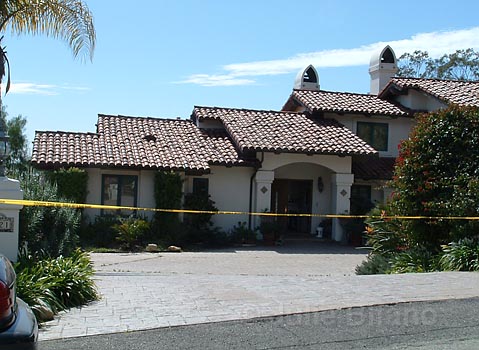Excessive Force or Suicide by Cop?
Trial Set for Deputies Sued in Donald George Wrongful Death Case

Only four people know what happened on the back porch of the George home on March 6, 2008, and one of them is dead. The other three are Santa Barbara Sheriff’s deputies who will go on trial for fatally shooting 64-year-old Donald George as he stood next to his walker with a loaded handgun.
Donald’s widow, Carol, sued the deputies in July 2009, alleging they hastily and needlessly gunned down her husband after she called 9-1-1 to report he was armed and suicidal. The deputies maintain they only fired on Donald after he pointed his gun at them. The District Attorney’s Office declared the shooting justified. Over the last five years, the excessive force case has worked its way through district and appeals courts, and after the U.S. Supreme Court denied a petition by county attorneys to have the civil matter dismissed on immunity grounds, a trial date in Los Angeles federal court was set last week for October 20, 2015.
The picture that emerges from testimony about that day is both tragic and murky. Early in the morning, Donald — despondent over his recent brain cancer diagnosis — told Carol, “I don’t want to live like this, I’m going to be a vegetable.” He asked Carol to leave the house, which she refused to do because she was afraid he was going to kill himself. She had also hidden the guns in their home earlier. A short time later, Carol watched Donald retrieve a gun from his truck and load it. She pleaded with him to give her the weapon and told investigators she tried to “yank” it out of his grasp but couldn’t.
At 7:44 a.m., Carol placed a frantic 9-1-1 call and screamed to dispatchers “No! No! No!” and “My husband has a gun!” She hung up twice before dispatchers were able to tell her deputies were on their way to 4621 Via Gennita off San Antonia Creek Road. She agreed to meet them at her front door. Deputies Jeremy Rogers, Jarrett Morris, and Joseph Schmidt arrived armed with AR-15 rifles, learning from Carol that her husband was on the back porch; she asked them to approach gently and not scare him. The deputies decided to surround the home, and one of them then spotted Donald on the porch with his walker and carrying a gun. The next 12 seconds are the crux of Carol’s lawsuit.

The deputies twice ordered Donald to drop his firearm. They say he didn’t, mumbled something to the effect of “no you won’t,” appeared to either cock the gun or remove the safety, and then pointed it at one of them. The three opened fire, shooting approximately nine rounds and striking Donald multiple times. Rogers said he fired again at Donald as he lay on the porch because the gun was still aimed in his direction. Donald died two hours later at the hospital. Back in 2008, Sheriff Bill Brown defended the deputies’ actions, explaining they had to a make a difficult, split-second decision in a life-or-death moment, and that they acted appropriately and followed proper procedure.
In her testimony, Carol claims that Donald had recently suffered a stroke and was extremely weak on his right side. She says he was physically incapable of holding and raising his gun as the deputies described. Two of the judges who ruled the case should proceed to trial also noted significant discrepancies in the deputies’ accounts. Their stories varied on which deputy decided to set up a perimeter, who first saw Donald on the patio, and in which hand he was holding the gun. The case documentation also holds conflicting testimonies over whether Donald first pointed his gun at Rogers or Morris.
The Ninth Circuit Court judges added that Donald was shot though he had not committed a crime, he was not resisting arrest or trying to flee, and the domestic disturbance appeared to have ended by the time deputies arrived. Therefore, they argued, Donald may not have posed an immediate threat. Last, Donald was entitled by the Second Amendment to have a loaded gun on his own property, the judges said.
In a lengthy and scathing dissenting opinion over the decision to allow the case to proceed to trial, Judge Stephen Trott sided with the deputies and took issue with Carol’s assertion that Donald was not strong enough to raise his gun. Trott pointed to her own statements that just minutes earlier Donald was able to walk to his truck and retrieve his weapon, load it by himself, then physically resist Carol’s attempts to wrest it from his hands. Trott also noted evidence offered by one of Donald’s friends — also suffering from cancer — that before Donald fell ill, he reportedly told the friend that he would “get a gun, call the sheriff, and have them shoot me” if he were ever diagnosed himself.
Since the shooting, Deputy Rogers has been involved in two other fatal incidents. In November 2009, he was responding to a wrong-way driver on Highway 101 when a nearby motorist and passenger were killed in a head-on collision with the suspect. Rogers was not held personally responsible for the crash, but the victim’s family was awarded a $4.8 million settlement from the county after they filed a negligence lawsuit and claimed Rogers failed to follow correct pursuit procedure. In 2012, Rogers shot and killed Matthew Berg after Berg had committed a burglary in Los Olivos and then reportedly tried to run over Rogers after deputies gave chase. The District Attorney’s Office said Rogers was justified in that shooting, but Berg’s family has taken issue with the deputy’s use of deadly force.
The Sheriff’s Office declined to comment on the George case or Rogers’s involvement in the three fatal incidents. County attorneys said they could not discuss pending litigation, and Carol’s attorney, Stephen Dunkle of law firm Sanger Swysen & Dunkle, also declined to speak about the details of the case.



